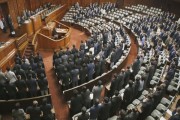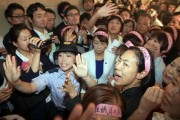The left-leaning Japanese newspaper the Mainichi Shimbun carried out a telephone opinion poll between July 17 – 18, to gauge the levels of support for the Abe cabinet following the forcing through of the controversial security bill, which would allow Japan to begin extending the role of its Self-Defense Force.
The poll found that Abe’s approval rating had taken a sharp drop to 35%, with 51% claiming they no longer supported the cabinet.
But right-wing netizens are fighting back, claiming that the results outlined in the survey are a consequence of a left-wing liberal agenda, and do not reflect the real opinion of the Japanese people.
What do you think?
From Mainichi Shimbun:
[Mainichi Shimbun Opinion Poll] Sudden Drop In Cabinet Approval Rating To 35%; 51% Do Not Support Cabinet

A graph from the Mainichi Shimbun article, showing the drop in cabinet approval rating. The blue line represents the number who support the cabinet; the red line represents those who do not support the cabinet.
On both July 17 and 18, the Mainichi Shimbun conducted an emergency national opinion poll following the passing of the security bill in the Lower House. It found that the approval rating for the Abe cabinet had dropped seven points to 35% when compared with the previous survey carried out on July 4 and 5, and is the lowest approval rating since the inauguration of the second Abe cabinet. Those rate for those who did not support the cabinet rose 8 points when compared with the previous survey, reaching 51%, or roughly half, for the first time. Regarding the forcing through of the security bill during the meeting of the Lower House Special Committee On Peace and Security Legislation on July 15, the 68% of respondents who stated it was “a problem” greatly outnumber the 24% who said it was “not a problem”. Criticisms of the security bill are growing, and it is assumed that the government and ruling party’s response to the situation has pushed the cabinet approval rating down.
◇68% Say Forcing Through Security Bill Is “A Problem”
62% now say that they are against the security bill, which would allow Japan to enact its right to collective self-defense (this is a 4 point increase compared with the previous survey), while 27% say the “agree” (a 2-point decrease), meaning that the gap between those who agree and those who disagree with the bill has increased. 28% of respondents thought that the security bill would act as an “increasing deterrent” to military attack against Japan, 64% are now concerned that it would lead to an expansion of Self-Defense Force activities overseas, and “are growing fearful that Japan would become involved in a war”. Around 90% of those who responded that “Japan would become involved in a war” were opposed to the bill. Therefore thinking that it would act as a deterrent, and thinking that the bill would mean Japan would become involved in a war, was implicitly linked with whether or not respondent agreed with the security bill.
Those who were “against” the government/ruling party’s plan to enact the legislation during this session of the Diet, which runs through September 27, constituted 63% of respondents (a 2 point rise compared with the previous survey), while 25% “agreed”with this action (a 3 point drop in comparison). The government/ruling party claim that debate in the Lower House has now been exhausted, but 82% of respondents – the highest of all — claimed that the explanation of the bill to the Japanese people was “insufficient”. Amidst this, even among those who are LDP supporters, there is a struggle between the 43% who believe the bill is “a problem” and the 47% who believe it is “not a problem”.
As regards the way that people want the opposition parties to handle the debate as it moves to the Upper House, responses were split. 38% said that they “wanted the bill to be revoked”▽, 32% said they “wanted the bill to be reformed” ▽, and 20% they “wanted them to participate in the debate”. Most people who support the opposition parties said that they wanted “revocation” of the bill, which stood out, but of those who supported the Japan Innovation Party (JIP), most respondents – 40% — wanted “reform”.
Support for political parties was as follows: LDP 28% ▽ DPJ 10% ▽, JIP 6% ▽ Komeito 4% ▽, JCP 5%. 39% of respondents stated that “they did not support any particular political party”.
Survey Method: The survey was carried out between July 17 and July 18 using random digital sampling, in which surveyors called telephone numbers randomly generated by a computer. This excludes telephone numbers from cities, towns and villages designated as part of the “difficult to return zone” after the Fukushima Dai-Ichi nuclear disaster. Of 1760 households selected, 1048 responded. The response rate was 60%.
Comments from Yahoo! Japan:
sat*****:
The results will come in the election
kin*****:
What will happen if the Diet is dissolved over this?
From the breakdown of support ratings, it doesn’t seem like there will be much change in the seats the parties hold at the Diet.
Plus, the opposing political parties are more dangerous.
痴呆建設局:
If this was a survey by the Sankei Shimbun there would have been high approval ratings.
dhi*****:
Seems like the approval rating depends on the media.
xyw*****:
I wonder if the media’s brainwashing will work this time, too? But there, I don’t think the Japanese people have forgotten how foolish they were when they were manipulated by the media and allowed the DPJ to have that massive victory.
s*****:
Yup, those grannies, grampas and youngsters are easy to fool.
When I was 20, too, I had the experience of being misled.
If you think about it a bit you’ll understand I suppose, but these people are swayed more by the opinions of celebrities, friends and the media than they are by their own parents. Not much we can do about that.
But let’s think of a few things. I think that if they were taught the correct version of history, and if they broadened their horizons globally, they’d soon come over to the right way of seeing things.
per*****:
In their reports the papers and TV will distort things when it’s convenient for them, and if they do surveys when it’s convenient for them, then this is the kind of result they’ll get.
By the way, they won’t show us the complete text of the survey, will they? They won’t tell us what kind of survey this really was.
ちょっとだけ言わせて・・・:
Umm, is this real?
zas*****:
We don’t know who they asked the questions to, or which questions they asked them, that’s what I always think….
hot*****:
And still, I bet that the LDP will get an overwhelming majority next year, too.
Comments from Twitter:
吉村 凌二:
Damn peaceniks
トモオ:
In the previous Lower House elections this was the policy of the Abe cabinet so why are people not supporting the cabinet at this late stage? The bad thing about Japanese people is that once you put some other problem in front of them, like consumption tax or whatever, then they fail to see anything else.
マックス:
Unless the cabinet approval rating drops below 30%, I reckon they’ll be able to get it back.
☆Junya☆:
Are there really so many idiots in this country?
“Not enough explanation”…They said the same thing back when we were voting on the Osaka Metropolis Plan, but it’s just that they don’t do any research or they’re ignorant people.
はや2000:
Wow, I see. Doesn’t look good. We’ll have to wipe out the DPJ.
八朔:
Congratulations. Here are the fruits of your distorted reporting. But we’ve made allowances for that much (笑)
ß:
Look, the Japanese people aren’t idiots, they know that this bill is necessary. Don’t be fooled by the way the Mainichi Shimbun manipulates the information.
渡辺 昇治:
If the cabinet has as much as 35% support in a Mainichi survey then isn’t it something they’re to be congratulated on?
お茶(濃い味):
Actually I find it weird that 35% still support them.
Aren’t a good number of that35% just managing to secretly control their anger? (´-`).。oO








